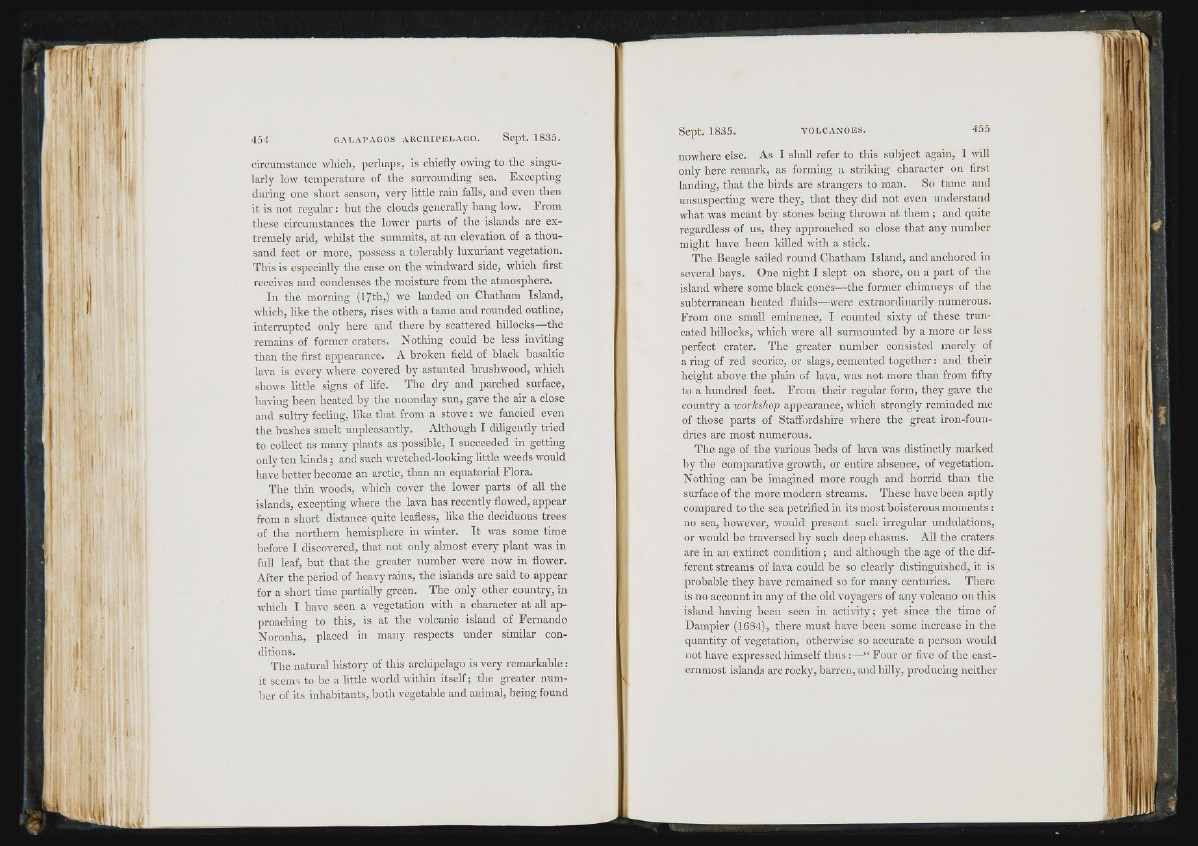
i;'
circumstance which, perhaps, is chiefly owing to the singularly
low temperature of the surrounding sea. Excepting
during one short season, very little rain falls, and even then
it is not regular: hut the clouds generally hang low. From
these circumstances the lower parts of the islands are extremely
arid, whilst the summits, at an elevation of a thousand
feet or more, possess a tolerably luxuriant vegetation.
This is especially the case on the windward side, which first
receives and condenses the moisture from the atmosphere.
In the morning (17th,) we landed on Chatham Island,
which, like the others, rises with a tame and rounded outline,
interrupted only here and there by scattered hillocks—the
remains of former craters. Nothing could be less inviting
than the first appearance. A broken field of black basaltic
lava is every where covered by astunted brushwood, which
shows little signs of life. The dry and parched surface,
having been heated by the noonday sun, gave the air a close
and sultry feeling, like that from a stove: we fancied even
the bushes smelt unpleasantly. Although I diligently tried
to collect as many plants as possible, I succeeded in getting
only ten kinds; and such wretched-looking little weeds would
have better become an arctic, than an equatorial Flora.
The thin woods, which cover the lower parts of all the
islands, excepting where the lava has recently flowed, appear
from a short distance quite leafless, like the deciduous trees
of the northern hemisphere in winter. It was some time
before I discovered, that not only almost every plant was in
full leaf, but that the greater number were now in flower.
After the period of heavy rains, the islands are said to appear
for a short time partially green. The only other country, in
which I have seen a vegetation with a character at all approaching
to this, is at the volcanic island of Fernando
Noronha, placed in many respects under similar conditions.
The natural history of this archipelago is very remarkable:
it seems to be a little world within itself; the greater num-
lier of its inhabitants, both vegetable and animal, being found
nowhere else. As I shall refer to this subject again, I will
only here remark, as forming a striking character on first
landing, that the birds are strangers to man. So tame and
unsuspecting were they, that they did not even understand
what was meant by stones being thrown at them ; and quite
regardless of us, they approached so close that any number
might have been killed with a stick.
The Beagle sailed round Chatham Island, and anchored in
several hays. One night I slept on shore, on a part of the
island where some black cones—the former chimneys of the
subterranean heated fluids—were extraordinarily numerous.
From one small eminence, I counted sixty of these truncated
hillocks, which were all surmounted by a more or less
perfect crater. The greater number consisted merely of
a ring of red scorioe, or slags, cemented together : and their
height above the plain of lava, was not more than from fifty
to a hundred feet. From their regular form, they gave the
country a workshop appearance, which strongly reminded me
of those parts of Staffordshire where the great iron-foundries
are most numerous.
The age of the various heds of lava was distinctly marked
by the comparative growth, or entire absence, of vegetation.
Nothing can be imagined more rough and horrid than the
surface of the more modern streams. These have been aptly
compared to the sea petrified in its most boisterous moments :
no sea, however, would present such irregular undulations,
or would be traversed by such deep chasms. All the craters
are in an extinct condition ; and although the age of the different
streams of lava could be so clearly distinguished, it is
probable they have remained so for many centuries. There
is no account in any of the old voyagers of any volcano on this
island having been seen in activity; yet since the time of
Dampier (1684), there must have been some increase in the
quantity of vegetation, otherwise so accurate a person would
not have expressed himself thus:—“ Four or five of the easternmost
islands are rocky, barren, and liilly, producing neither
i r 1.1
dii